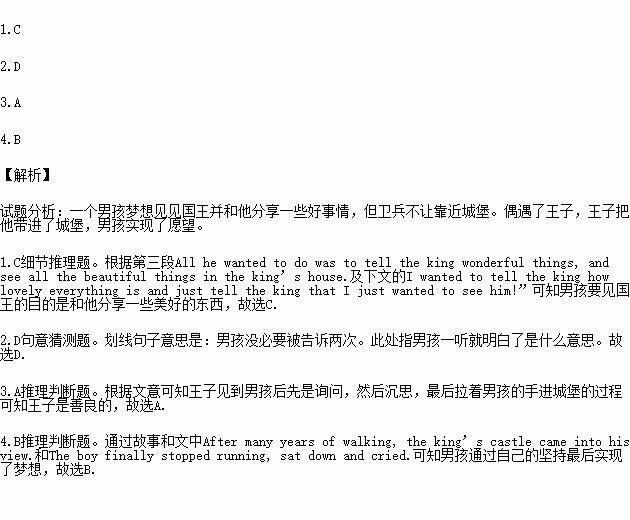题目内容
There once was a little boy who wanted to meet the king. He set off, walking towards the king’s castle. After many years of walking, the king’s castle came into his view. However, as the boy drew closer to the outside of the castle, the guards noticed him.
“Get out of here!” ordered the guards.
Well, the little boy didn’t have to be told twice. He turned…and ran. All he wanted to do was to tell the king wonderful things, and see all the beautiful things in the king’s house. But he couldn’t even get near the castle! The boy finally stopped running, sat down and cried.
A young man happened to be coming down the path at the very moment. He saw the little boy and stopped. “What’s wrong, young man?” he asked.
“Sir, I walked and walked just to see the king. But these guards made me scared. I wanted to tell the king how lovely everything is and just tell the king that I just wanted to see him!”
The man looked at the little boy thoughtfully. “Look, why don’t you try again? I’ll come with you this time.”
The little boy got up and took the man’s hand. The king’s guards spotted them.
“Look, mister, we don’t have to do this…I don’t want you to get hurt. We can just turn around now.”
The man held the little boy’s hand and went on. The boy really thought the man might be crazy until he looked back up at the guards. They were all smiling now. The little boy was amazed.
“Who are you?” asked the little boy in astonishment.
“Why, I’m the king’s son. You can enter the castle and be with the king.” Said the man.
The little boy broke into a huge smile.
1.Why did the boy want to see the king?
A. To get some help from the king.
B. To invite the king to visit his beautiful village.
C. To share wonderful things with the king.
D. To ask the king to play with him.
2.What does the underlined sentence in the paragraph mean?
A. The little boy didn’t understand the guards’ words at first.
B. The guards repeated the words to the boy.
C. The little boy had been to the castle twice.
D. The little boy understood the guards’ words immediately.
3.According to the passage, the man is .
A. kind B. stupid C. ambitious D. mean
4.Which of the following best suits the story’s lesson for us?
A. Never judge a book by its cover.
B. Anything is possible if one tried hard enough.
C. Life can sometimes be unfair.
D. Make new friends and keep the old.
 天天向上一本好卷系列答案
天天向上一本好卷系列答案 小学生10分钟应用题系列答案
小学生10分钟应用题系列答案
